Chairman’s Report for January 15, 2016
First Christmas for Refugees dinners of 2015 held in Iraq
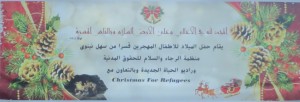
A large banner proclaiming Luke 2:14 “Glory to God in the highest, and on earth peace, good will toward men.” at a Christmas for Refugees event in Iraq.
More than 300 children served in (REDACTED) center: The event was loud but that is to be expected of events for children in Iraq compared to Lebanon.
The first event in Iraq was held in a hall barely large enough for the 326 children (some of them from other nearby refugee centers) who attended. We seek to limit ages to six through twelve, so children are old enough to understand the Gospel message that is delivered. Volunteers from local ministries and churches helped with presenting the program. (REDACTED MATERIAL)
The program included a puppet show proclaiming the Gospel. Three clowns, including a deliberately clumsy magician, received big laughs from the children, even as they taught basic Biblical truths about honesty and honoring parents. Games included a coloring contest and a balloon game. Carols and other traditional Christmas songs were enthusiastically sung by the children, and some older children presented a play which included a Nativity scene. Each child’s family received large box food staples.
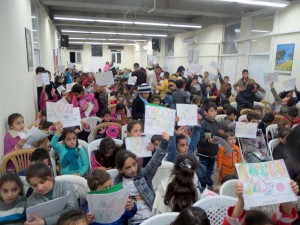
Part of the program included a coloring contest. Here children hold up their drawings hoping to win a small prize. Every child eventually received a gift.
Religious Freedom Coalition team monitored Christmas events: The Christmas for Refugees program greatly expanded in 2015, with new events in Lebanon, Jordan and Iraq. The Religious Freedom Coalition team monitored and participated in events in all three nations including those in Iraq mentioned above.
Our team consisted of myself, my wife Nancy, and former board member Robert Armstrong who heads Love Link Ministries. After participating in events in Lebanon, we were in Jordan on December 16th and 17th. On December 18th Nancy and I had to return to Lebanon to monitor additional events for the children at an Assyrian Church.
Puppet shows a big hit: This year the program specified to participating ministries that a puppet show be included in all events if possible. The puppet shows explain to the refugee children the real meaning of Christmas and the purpose of the coming of the Lord.
The intent of the shows is to reinforce the spiritual meaning of Christmas for children who have been torn from their homes. Most Iraqi and Syrian Christian families in their home countries were middle class, and now find themselves in extreme poverty, living for the most part off of charity.
In Jordan there was singing of children’s Christmas songs and Christmas carols before the puppet shows. After the puppet show children were asked questions about the show and its meaning. Most raised their hands to proudly answer that Jesus came as the Savior of mankind.
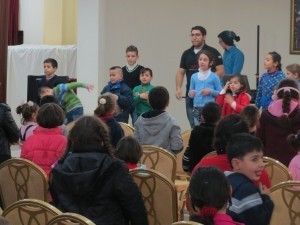
Some children took turns going onto the platform to help lead the singing. About 150 children plus parents were at this event in Amman, Jordan
In the larger places where the Christmas events were held, such as in big Orthodox churches, the parents sat in rows of chairs in the back while the children were all in front to be able to participate better. It was obvious that the children, at least for a few hours, were able to forget about their present state, which is a major goal of the entire Christmas for Refugees program. The Christmas program is a break for the children from the horror of their current state of poverty, being away from all that is familiar to them.
The meals at one event in Jordan were somewhat different because of local traditions. Most of the families served were Orthodox from Iraq and the adults were fasting from meat. Rice and fish were served to the older children and parents. The younger children, who are allowed to eat meat during fasting times, were given a special treat of a hamburger and fries, something they miss from home and which parents and local organizers had requested for them. In all other areas we served the children received a traditional Christmas meal.
In all three nations children looked forward to an appearance of Bābā Nuwayl (بَابَا نُوِيل) to bring them the gifts they were told they would receive. Bābā Nuwayl is of course Santa Claus and he is a big part of Christian celebrations of Christmas in the Middle East. This may seem odd to many Christians in the United States, but in Christian villages each year Christian images such as Nativity scenes appear right alongside Santa.
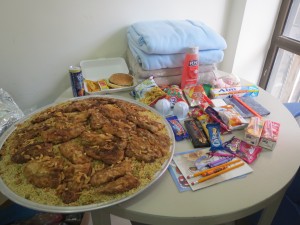
Parents were served from large platters of fish and rice and children received individual box meals consisting of hamburgers and fries. Children also received blankets and other essentials like soap and toothpaste, as well as candies and Gospel work books as gifts to take home.
Some mothers had sown red and white outfits for their children, which is a tradition for Christians in all three nations. The red and white colors have less to do with the concept of Santa Claus than with distinguishing themselves from Muslims at Christmas time, and showing the joy of Christmas to others.
In Jordan each child received a plastic bag containing essentials such as tooth paste, brushes and soap as well as small toys, chips, cakes and some sweet candies. As the families were leaving, the children also received Christian themed work and coloring books.
Each family in Jordan and Iraq received a large package of food staples including cooking oil, powdered milk, rice, flour and canned and boxed goods. In some of the urban areas in Lebanon the families received a $60 voucher to purchase food at a market rather than the packages.
In all three nations, the number of local volunteers from the Christian community who donated time and talent cannot be emphasized enough. At the larger events in Iraq for over 300 children, there were a total of over forty volunteers. At one location in Iraq over 300 chairs for children had to be carried up five flights of stairs. The puppet show stage had to be built and carried to each event. Enough volunteers had to be on hand to manage hundreds of children and hand out meals to them as well. Then there was the transportation of the children in buses to the various events and the important work done by those who helped to keep track of the children and keep them safe.
Christmas for Refugees program is making a difference: One of the greatest experiences of our team was seeing some hope and joy in the eyes of children whose families have been persecuted and displaced. For at least a few hours they were so much a part of a Christmas celebration that they forgot the horrid circumstance their families are now in.
On December 19th when we were on our way to the Beirut airport to travel back to Amman, Jordan we passed one of the buses of refugee children who had been at one of our events. They were still singing and laughing and when they saw my wife Nancy and me in the car next to them they all waved excitedly at us. The scene brought tears to my eyes as I remembered one little girl who began to cry when she walked out of the church, saw the buses, and realized she was headed back to the dismal refugee life of her family.

In Jordan strong plastic bags were filled with food staples including canned meat, cooking oil, rice and powdered milk. In Iraq cardboard boxes were used. It was a joy to the families to receive food that could last a week or more
Heart Warming Events: No one church or organization could host all of the events we held in Lebanon, Jordan and Iraq, and as a result the programs varied even though our general guidelines were being followed. There were no failures and every program was special because the adult volunteers had their hearts in it. Two of the programs in Lebanon were held in an unheated indoor soccer practice field with a cement floor. There were not chairs but the kids had a great time and sat in small group circles on the floor to eat their meals.
At one event in Lebanon a youth minister volunteered to tell the Gospel story to a pastor and the pastor asked the children to tell him if the young man made a mistake. The young pastor started by saying that Mary found out she was pregnant on the Internet. The kids laughed and screamed “No, no, it was the angel! Each time the young man made a mistake the children corrected him. By the end of the story it was the children who had proclaimed the Gospel story. It was a unique and fun program.
In urban areas in Lebanon, for the most part larger Catholic Church facilities were used, even though most of the children from Iraq were Orthodox. The program at those churches was conducted by a Baptist organization and often the priest in charge would come and thank us for helping the children. Catholic youth workers helped to serve the meals at another church.
In Jordan a REDACTED Church helped. REDACTED. Again the program was evangelical. Other programs in Jordan were in Orthodox churches.
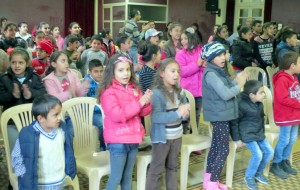
At this Christmas event north of Beirut one of the youngest girls began to cry when it was time to leave. At one point all chairs were stacked for the children to be able to play various organized games.
Understanding Jesus as Lord: Regardless of the church or public hall used, Jesus was presented as the Savior of mankind, the final sacrifice so that all who believe may be saved from Satan’s evil plan of sin and death. At every venue the children were given the opportunity to pray for Jesus to come into their hearts. There was play time, great games, good music and food – but the main reason for the program was the hope provide by the Father through his son Jesus.
Program goes viral: The weekend of December 12th the Chaldean Catholic Church sent a small group of refugee children to one of our Christmas events in Lebanon. The priest who accompanied the children was so impressed that he decided to duplicate the program at his church. As a result, our team in Lebanon presented the entire Gospel centered Christmas program to 400 more children at that Chaldean Church. The type of program we are offering to the refugee and displaced children had not previously been held at churches in this area.
A big thanks from all the Christian refugee families goes to those who donated their time and dollars to make a Christmas possible for their children.
There were some downsides as well: Our partner ministry in Iraq had arranged for two events for 300 children each. The first went as planned, at REDACTED center mentioned in this newsletter. When we arrived at the second location, I was shocked by the sheer number of displaced persons. It was then I learned that about 1,800 children were in the camp and 300 of “those in most need” had been chosen for the Christmas program and dinner. I was incredibly saddened that perhaps 1,500 children, the majority in the camp, would not be able to participate.
I made our ministry partner and myself a promise that we would somehow run the program for all 1,800 children in the camp next year. How, I am not sure. I talked with our ministry partner in Iraq and they are working out a plan for volunteers and said they think they can do two programs a day for three days to be able to handle all the children. Of course, we must make the commitment to be able to supply the funds for such an undertaking.
The plea for diapers: There is a shocking need for diapers at all locations for diplaced people in Iraq. The one request we received over and over again was for diapers. We were told, “Americans send lots of clothing, but babies need diapers more than clothing.” There is also a great need for adult diapers.
Within ten days of returning to the United States I found some donated diapers. So far we have a 24 foot truck container full of diposable diapers. Which is good, but a sea-going container is 40 feet long. We want to fill the remaining 16 feet of the container with babies’ cloth diapers, which are needed more than disposable ones. We must get the diapers to a warehouse in Norfolk, Virginia. When the diapers are gathered they must be loaded in a container and shipped to a port in Turkey, and then trucked to Erbil, Iraq. This will cost us in total about $8,000.
Please donate to the Christmas for Refugees diaper project to help.
POST CARD CAMPAIGN: At the end of December we mailed more than 50,000 letters to social conservatives, along with post cards to send to Congress demanding our nation stop funding Islamist fighters in the Middle East. Islamic terror must be stopped! The United States must stop picking certain groups of Islamists to arm. No matter their name, they all kill and drive out non-Muslims. We have to stop President Obama and the Republican controlled Congress from arming groups that turn the weapons against Christians and against America.
Although I have written mostly about the Christmas program the last two or three months, our work continues on Capitol Hill every day that Congress is in session!
You can be a part of Christmas for Refugees in 2016 by donating today.
William J. Murray, Chairman
Religious Freedom Coalition, 601 Pennsylvania Ave. NW #900, Washington, DC 20004 * (202) 742-8990

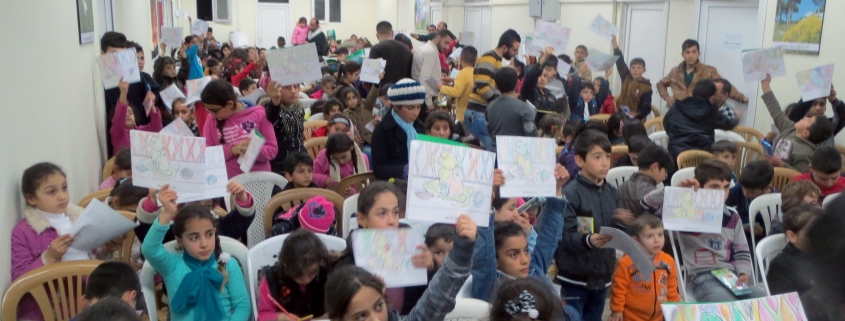
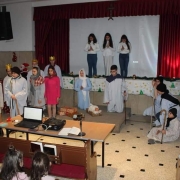
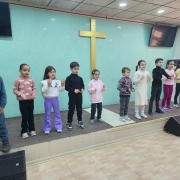
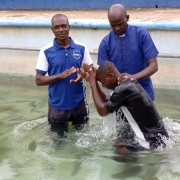
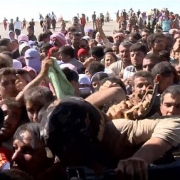
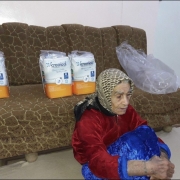


Leave a Reply
Want to join the discussion?Feel free to contribute!